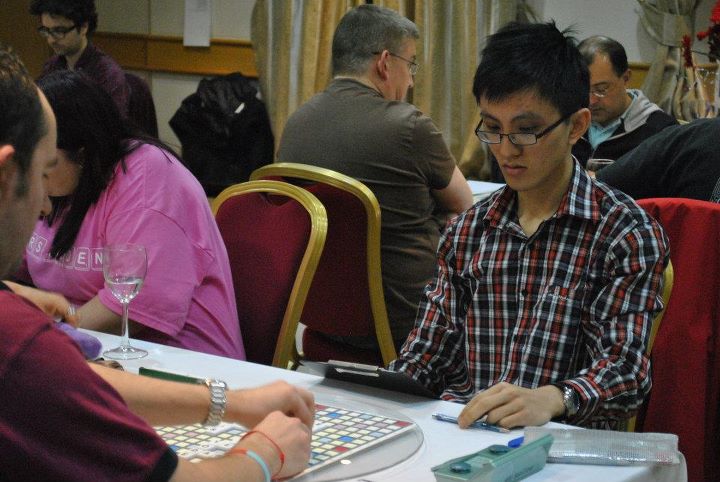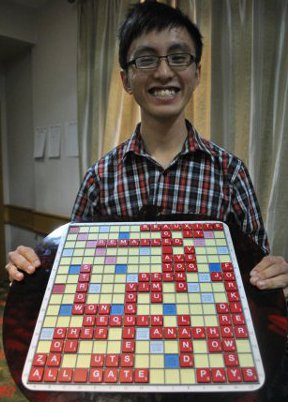Meet 'Mr. 850' Toh Weibin
Toh Weibin is a 21 year-old Singaporean currently doing his undergraduate studies in London. He started competitive play in 2004 and is a former World Youth Scrabble Champion. On January 21st 2012, in game 5 of the Northern Ireland Scrabble Championship in Belfast, Weibin broke the world records for highest game and spread in an official tournament by defeating Rik Kennedy 850-259, ultimately finishing 4th at the championship, which you can read more about here.
Nikhil Soneja spoke to the unassuming Weibin about his remarkable feat:
Congratulations on the record and a fantastic performance at the high calibre NI tourney. How do you feel?
Thank you. I'm pretty satisfied with both the record and tourney. I don't think I play as consistently as the players at the very top (some of whom were at the NI tournament) so I must have been rather lucky to finish where I did. A better player would probably have won the title with my tiles. Still, it was a thoroughly enjoyable tournament and I will try to return next year.

Pictures provided by Stewart Holden
Did you know about the existing records beforehand? Did you play differently once you knew a new record was in grasp?
Honestly, I didn't know I broke the records until people told me so! At that point I was just trying to enjoy the game (as I'm sure Rik was as well) and score decently enough to keep the spread high. I don't think I would have played many of the moves different if it were a closer game.
I did vaguely recall hearing about Joel Sherman's 803 game in TWL but I didn't take much notice of the game, apart from briefly scanning through the individual plays on cross-tables. I'd never heard of the 830 game (which seems fluky, but a record is a record), or bothered about the ABSP records. Never been much of a records person...
You had two nine-timers, BEAUXITE (a whopping 275 points, no blanks) and ALLIGATE (for 122)...was 275 a personal best as well? How did the openings arise?
275 is my highest word score - I'm rarely one to get nine-timers, and probably miss them more often, actually. It did help that BEAUXITE was a natural that jumped out at me and ALLIGATE was not too difficult to see out of a rack of ?AAEGLL through an open T in the 7th position. I'd opened the nine-timers myself after playing bingos to open the triple lanes up, which Rik presumably left open for himself to capitalise on later in the game.
850 Toh Weibin at 22.01.2012 Northern Ireland Championship 2012, opponent Rik Kennedy got 259
739 Mark Kenas at 16.11.2008 World Players Championship, opponent Sam Dick-Onuoha got 285
728 Craig Beevers at 05.12.2010 Causeway Challenge, opponent Odette Rio got 303
727 John O'Laughlin at 15.06.2008 Texas SOWPODS Challenge, opponent Michael Early got 417
723 Leonora Labog at 26.06.2011 26th BRANDS King's Cup, opponent Lim Sha Lyn got 288
723 Craig Beevers at 11.05.2010 European Open Scrabble Championship, opponent Jojo Delia got 419
715 Nigel Richards at 09.12.2010 Tournament of Champions, opponent Adam Logan got 325
709 Ganesh Asirvatham at 18.12.2005 4th Causeway Challenge, opponent Amnuay Ploysangngam got 445
702 Theodoro Martus at 30.11.2011 CAUSEWAY 2011, opponent Jesse Day got 425
702 David Eldar at 08.12.2009 Johor Bahru Rnd Robin, opponent Mpakaboari Jack got 348
High game (OSPD - tourney): 803 Joel Sherman vs Bradley Robbins (285), Stamford CT on 9.12.2011
High game (OSPD - club): 830 Michael Cresta vs Wayne Yorra (490), Lexington MA on 12.10.2006
High game (OSW - club): 793 Peter Preston in 1999
Compiled by Edward Okulicz
You're a former world youth champion (2007). Do you feel coming through the youth ranks has made the transition to adult tournaments easier? What advice would you have for other youth Scrabblers who hope to emulate you?
Though I did play in two WYSCs I wouldn't describe my experience as coming through the youth ranks - in fact a lot of my learning came from online and tournament play against adults, rather than those two youth tournaments. I do however think the 2006 WYSC was instrumental in kickstarting my ambition to do better in tournaments - despite finishing 6th, I felt thoroughly lousy about my plays (including an infamous game where I lost 300 equity points and apparently missed PARTYIN(G)). Comparing my poor play to those of my peers (which I then felt were fairly well thought out), I strove to improve my strategy and word knowledge for future competitions.
I think the most successful youth Scrabblers are those who step out early and compete against stronger players, regardless of their age. Some of the most successful examples include David Eldar, Ong Suanne, Alastair Richards, Austin Shin and the recent WYSC Champion Anand Bharadwaj who all started at a very young age against adult competitors. The best way to improve is to observe and learn from stronger players. I wouldn't encourage youth Scrabblers to emulate me!
You took part in the 2011 WSC, what was that like?
It was a very pleasant tournament experience, in probably the toughest field I'd played in (I've never been able to make the top division of Causeway, unfortunately). I was very happy to be able to go since I'd missed the last WSC due to National Service. I did intend to prepare very hard for the competition but my schedule was disrupted when I was settling into university. It was difficult, knowing that each blunder would likely cost me the game, and also that I was not just in it for myself - Singapore had to fight very hard this time to retain its 4 spots. I'm glad to have had this opportunity and hope to qualify again in 2013, though it may be difficult as there are many decent players in Singapore.
 Now that you're studying in the UK, are you active in ABSP tournaments? How is the scene different from that in your native Singapore?
Now that you're studying in the UK, are you active in ABSP tournaments? How is the scene different from that in your native Singapore?I've played about 5-6 tournaments since coming here in late September, so I guess I've been active. I should be slowing down soon though...I think the scene in the UK is very different from Singapore's tournament scene. There tends to be less games per day in UK, often with tea breaks, and this gives to a more relaxed atmosphere with ample opportunity for chat with other players. In Singapore we try to play many games in a day (9 or even 10) and we rarely converse about anything except Scrabble itself! There are good and bad things about each approach, I guess.
The strength of the field in the UK is more diverse compared to Singapore, which sees most of the top players playing in most of the competitions, and a general shortage of intermediate players. This definitely has to do with the geographies of both countries - in the UK top players are more picky about which tournaments to attend because of long distances and expenses, whereas the longest time I've taken to get to a tournament in Singapore is probably about an hour.
How do you practise for tournaments (ie; word study, game analysis, online play etc) and has university affected your training regime?
I've tried many methods to do well at tourneys, including the occasional superstitious belief about the positions of racks, clocks etc during the game and clothes to wear during a tourney. In terms of actual word study I've used a variety of programs, but tended to focus heavily on Lexpert and Jumbletime. I'm trying to jump on the Zyzzyva bandwagon now because it seems to bring more stability and schedule to the process, however I find word retention rather difficult on Cardbox, especially when I don't study every day. I analyse my games on Quackle, though I take its analyses with a pinch of salt. I play on ISC and Facebook, and am trying to resist all other modes of online play at the moment.
I don't think I have a 'regime' to speak of so university hasn't really changed much! In fact I'd think university is one of the best times for me to improve my game - some of the players at the very top hit their peak when they were studying. I doubt I'd be able to put as much time into the game when I start working.
What do you feel your biggest strengths as a Scrabbler are and are there any particular styles of play you prefer?
I wouldn't say I have any particular strengths since I tend to make different errors in each game (e.g. mistracking, losing equity, phonying etc) - I do however think that playing Scrabble has taught me to focus better, to bounce back better from failure and to be more patient with things in general. Not great, but trying to get there.
To answer the second question, I'd first like to quote Joel Wapnick who was interviewed on Word-Buff:
Q: Can you give a specific example of a game situation in which a player's personal style would play a big role?
A: A big role? No. Most players' "playing styles" differ only in their propensities for blundering.
I think this statement is very true - the mathematics behind the game tends to leave little room for manoeuvre in terms of style. So no, I don't particularly like any "style" of play. It is interesting to note, however, how Nigel Richards tends to play a more open game at the beginning and largely benefits from doing so.
What are your future plans? When will we see you next at a tournament and do you think the record-holder reputation going in will help or hinder you?
I intended to take a break after the NI tournament but found myself trying to sign up for one within a week - I really enjoy playing and will do so if it's not too far or expensive. I don't think I'll be playing too much till I return to Singapore about June/ July - may pass by the King's Cup then. I guess the reputation won't do much for people who already know who I am and how I play, but it might subconsciously affect people who don't - in the way people supposedly play differently against Nigel. Who knows.
The full annotated game can be found at cross-tables.com
January 2012